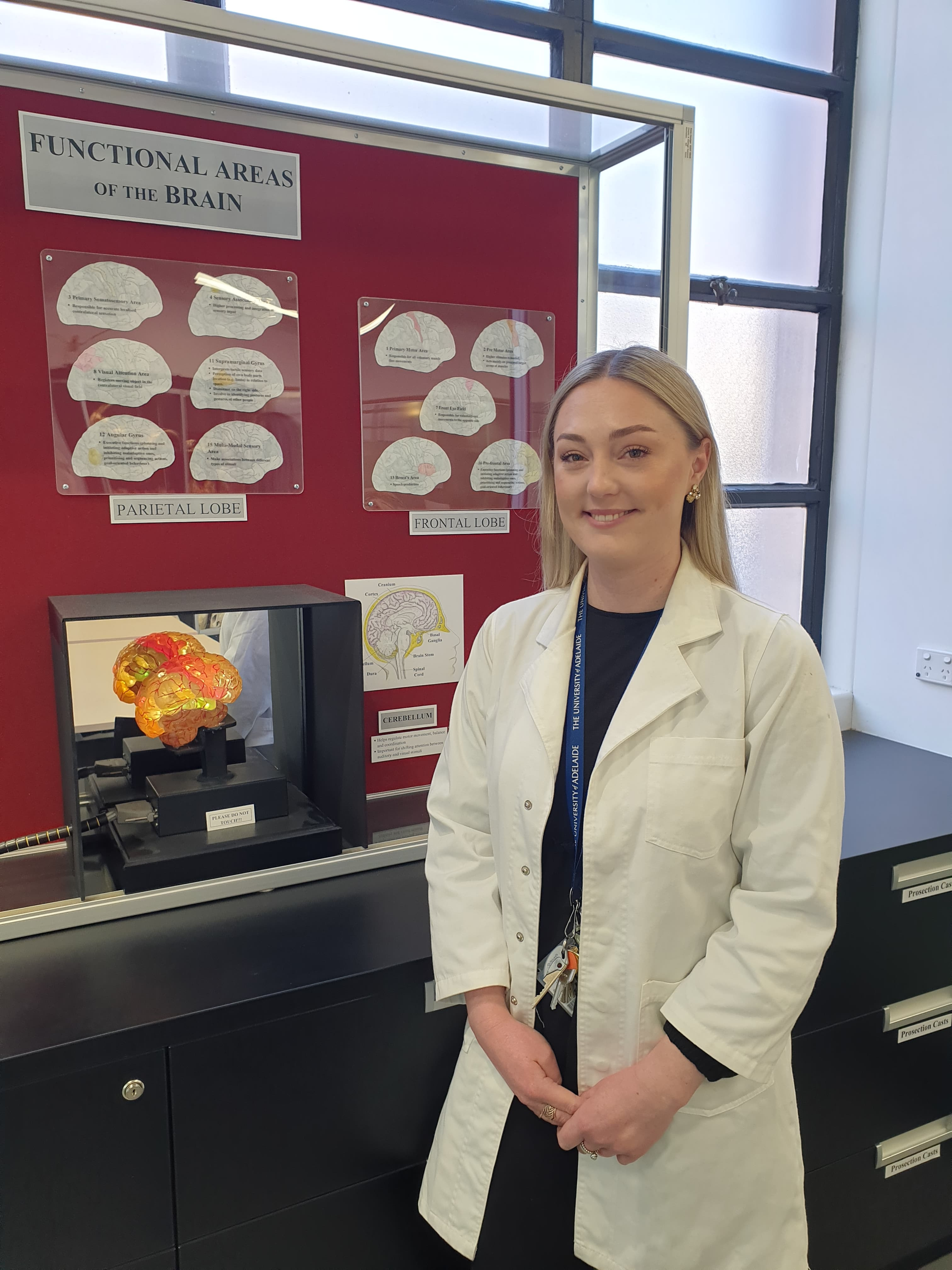Interview with Jessica Sharkey, PhD Candidate

What is your PhD research focused on?
My PhD research has been focused on developing a pre-clinical surgical model of traumatic brain injury (TBI), in order to provide better clinical translation and understanding of the pathology we see in the human condition. We hope in the future this model will be able to inform the development and successful translation of potential new pharmacotherapies for TBI.
What findings are you looking for and why?
Damage to the axonal white matter tracts (the signalling fibres in your brain cells) is a key cause of neurological impairment and long-term disability following TBI. However, a greater understanding of this axonal injury is needed to develop clinically translatable treatments. We are hoping to characterise the profile of axonal injury across the spectrum of mild to moderate to severe TBI and further understand the pathology that may contribute to this via the development of a more clinically relevant model that demonstrates the pattern of axonal injury seen in the human condition.
What motivated you to pursue this area of research?
I have always been fascinated by the brain, a single organ which has the capacity to control not only your physical body but your mind - it's amazing! I often find myself awake at 2am thinking about the beautiful intricacies of the brain's anatomical structure. In terms of deciding on a speciality; TBI is one of the leading causes of death and disability world-wide and we likely all know someone who has been affected by brain injury, whether that be suffering a concussion in a footy game or more serious and devastating injuries sustained in a car accident. I want to be able to relieve the burden of disability for these people affected and increase their quality of life both short term and long term, especially with increasing awareness surrounding the development of neurodegenerative diseases following TBI (Alzheimer's, Chronic Traumatic Encephalopathy etc).
What do you hope to achieve in your career in the future and why?
My career is only just beginning which is scary and exciting. I am very passionate about neurotrauma and I likely will continue my research in this field for the foreseeable future. My long-term goal is to take my skill set overseas and work with world renowned neurotrauma researchers in America and eventually develop my own independent research (which was planned to go ahead this year, until we encountered a worldwide pandemic crisis!). My plan for now involves moving to Melbourne next year and beginning my Post-Doctoral research fellowship, which is centred around running a cutting-edge clinical trial investigating brain oxygenation following acute brain injury, under my mentor Dr. Barry Dixon, an intensive care specialist at St Vincent's hospital.
What has been a highlight for you during your PhD program and why?
Undoubtedly, the highlight of my PhD was being given the opportunity to go to America in 2019. During this time I attended and presented my research at the National Neurotrauma Society conference in Pittsburgh and did a week long laboratory exchange with Professor Geoff Manley at the Brain and Spinal Injury Centre at Zuckerberg General Hospital and Trauma Centre - San Francisco and Professor Denes Agoston at Uniformed Services University - Maryland; two extremely notable laboratories. This trip allowed me to further my career more than I could have imagined, now having multiple collaborations with researchers in America.
How do you hope your research will help patients with a TBI?
I hope that my research will help to form the building blocks for more clinically relevant research into TBI. I hope that this pre-clinical model will be able to be used by researchers to develop treatments and pharmacotherapies that will translate to humans and therefore improve their quality of life after injury and decrease their burden of disability.
What motivates you to get up every day and continue your research?
At the moment I'm motivated by having an end goal in sight of beginning my dream job in December! But the day to day motivation really comes from the extremely supportive group of peers we have in our laboratory who I can count on for advice both scientifically and personally! Two of these people have become best friends (fellow finishing PhD's - Bianca and Annabelle), who I couldn't have made it through without! I have also been very lucky to have three amazingly knowledgeable supervisors A/Prof Renee Turner, Dr Frances Corrigan and Dr Anna Leonard who have taught me all I know.
When did you gain an interest in science? Was it at school? Or an experience you had that lead you to want to pursue research as a career?
I gained an interest in science in when I was in high school, about 14 or 15 years old, I actually used to watch RPA and Ambulance (shows on TV, which is quite funny) and was fascinated by medicine and the human body. I knew this was something I wanted to pursue as my career but I didn't know what facet of that I would really enjoy. So I decided to do a general bachelor of health sciences and that is when I discovered that I loved the brain, and became particularly passionate about TBI due to the incredible health burden this condition has on the entire world. So, I knew I needed to be a part of the research that could help change this and I've never looked back!




